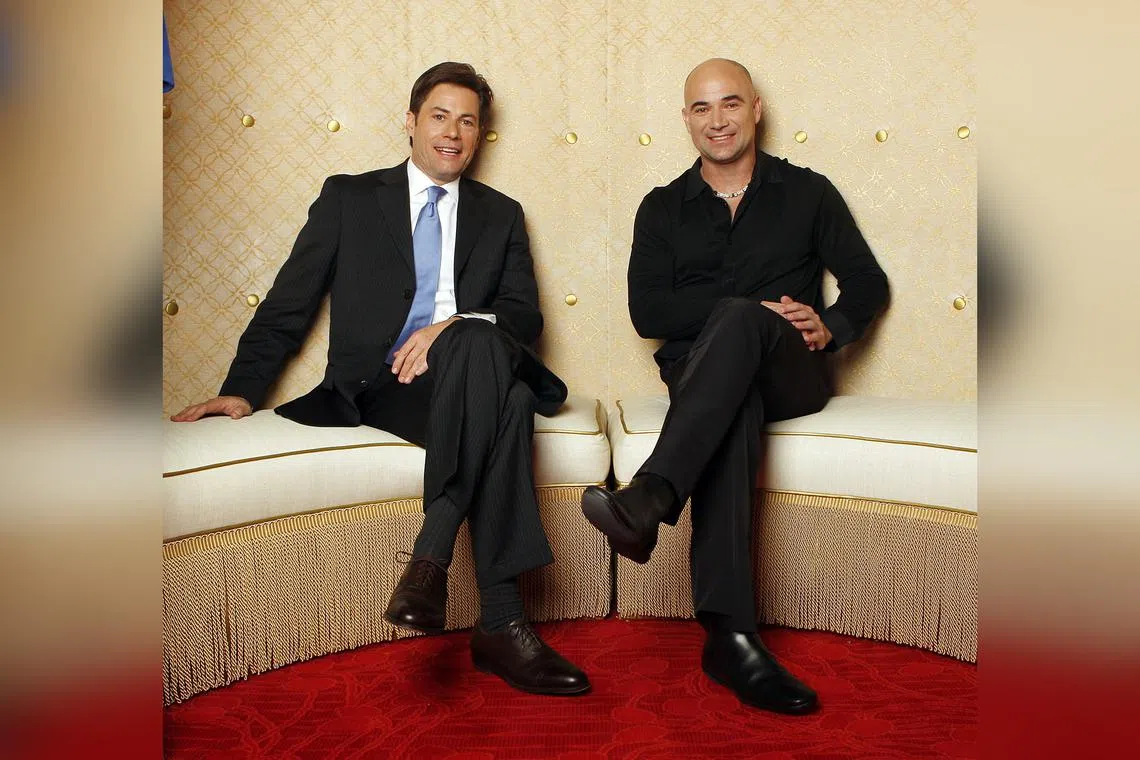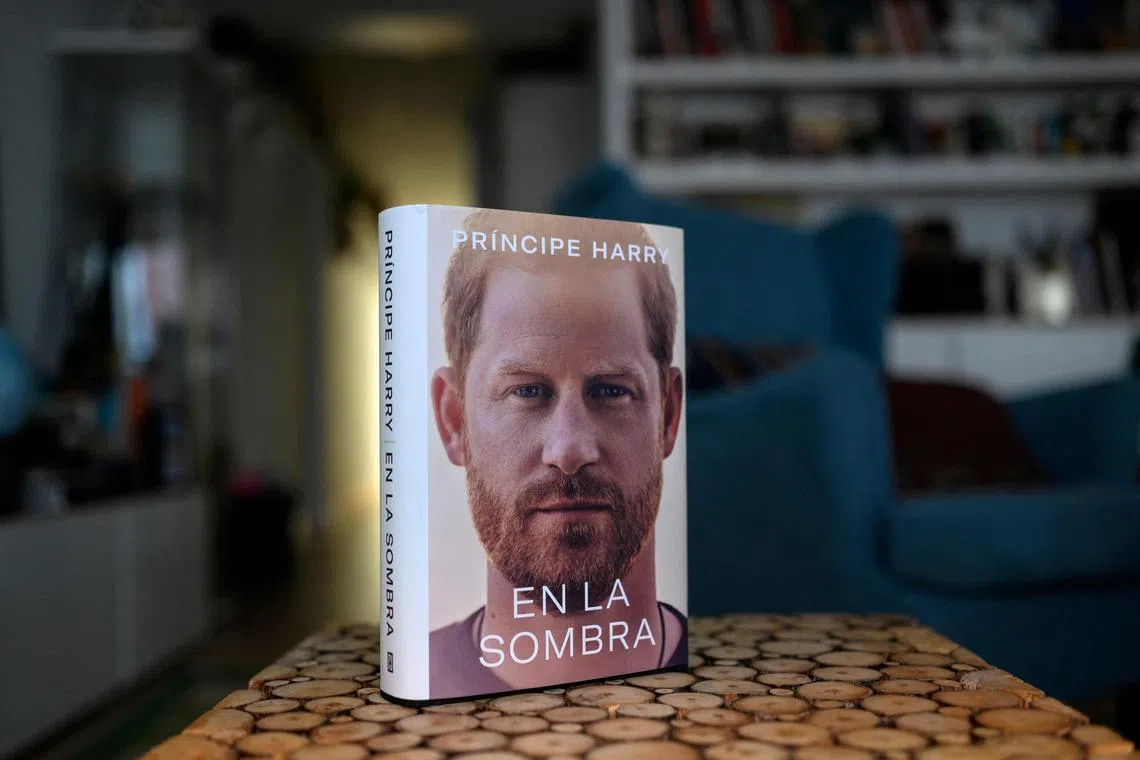Prince Harry’s Spare: When the memoir demands talent and discretion, call the ghostwriter
Sign up now: Get ST's newsletters delivered to your inbox

Ghostwriter J.R. Moehringer (left) and tennis player Andre Agassi worked together on Agassi’s highly regarded memoir, Open.
PHOTO: NYTIMES
NEW YORK – The cover of the new memoir by Britain’s Prince Harry
What the cover does not include is the name of the book’s ghostwriter, J.R. Moehringer.
Perhaps the most exalted practitioner of a little-understood craft, the 58-year-old American aims, ultimately, to disappear.
Ghostwriters channel someone else’s voice and construct with it a book that has shape and texture, narrative arc and memorable characters, all without leaving fingerprints.
Doing it well requires a tremendous amount of technical skill and an ego that is, at a minimum, flexible.
“If I’m a great collaborative writer, I am a vessel,” said Michelle Burford, who has written books with actress Cicely Tyson and musician Alicia Keys. “The lion’s share of my job is about getting out of the way, vanishing so the voice of my client can come through as clearly as possible.”
The process can vary widely from writer to writer and project to project. There are writers who push hard to have their names on the cover and those who never do. Sometimes, writers who do not agree with their subjects expressly request that their name be left off.
Fees can range from about US$50,000 (S$66,750) to hundreds of thousands of dollars.
“Authors run the gamut from someone who is a complete control freak and has to approve every semicolon to those who barely phone it in,” said Ms Madeleine Morel, an agent who specialises in matching book projects with ghostwriters. “And when you start working with someone, you don’t know where they’re going to fall on that curve.”
Often, a writer will meet the subject only a few times, then follow up with phone calls, e-mail and texts. Others say that in order to get enough of a sense of the person to capture on the page, they need at least a few dozen hours in the presence of a client, sitting together in a room or shadowing the daily routines of the subject’s public and private lives.
To write Andre Agassi’s 2009 memoir, Open, Moehringer moved to Las Vegas, where the tennis star lived. Agassi said he bought a house 1.6km away from his own, and Moehringer occupied it for two years while he worked on the book.
All the writer requested was a long table where he could lay out the scenes he would piece together “like a necklace”, Agassi recalled. They would meet in the morning, fuelled by breakfast burritos from Whole Foods.
“I’d spend a couple of hours with him over breakfast and a tape recorder,” Agassi said.
Open is widely considered a paragon of sports autobiographies – a raw and honest excavation of a well-known life. Agassi said he sought out Moehringer to write the book after reading Moehringer’s memoir, The Tender Bar, about growing up with a single mother.
“It was the first autobiography I’d read that didn’t feel like a global press conference,” Agassi said.
A former newspaper reporter who won a Pulitzer Prize for feature writing, Moehringer has a reputation for intense work habits – he rarely sleeps when finishing a book – along with a good sense of humour and strong opinions about the projects he works on, even if they ultimately belong to somebody else.
Like any reliably employed ghostwriter, he is also known for his discretion.
Agassi said Moehringer asked the hard questions needed to help him dig deeper, but that he felt safe throughout the process. The honesty that resulted from their collaboration is part of what made the memoir so highly regarded.
Burford, who collaborated on Keys’ memoir, said a significant part of her job is making her clients comfortable by creating the right circumstances for them to open up.
She broaches delicate subjects in phone calls late at night, she said, when clients can curl up on the couch, maybe feeling like they’re “talking to a stranger on the bus”.
She will also try to mirror her clients: If they show up in a T-shirt and jeans, she will dress casually as well.
“I’m often working across racial and gender lines,” she said, “and anything I can do to make us feel more alike than different is helpful to the collaborative process.”
For a long time, any book written by a ghostwriter was dismissed as merchandise. Many potential readers still might consider a book with an additional writing credit on the cover to be less intimate, as if the collaborator were a barrier between the reader and the subject.

A copy of the “En la sombra” (In the shadow) Spanish version of Britain’s Prince Harry’s autobiography Spare.
PHOTO: AFP
The fact is that most people do not have the time or ability to write a good book, practitioners said.
“Writing is a technical skill,” said Jon Sternfeld, whose collaborations include a best-selling memoir by actor Michael K. Williams. “People don’t give it the technical credit it deserves.”
In recent years, the stigma has started to melt away, in part because some of these books, like Open, are very good.
Ms Morel said: “In the old days, nobody would ever admit to working with a ghostwriter or collaborator, and now it’s accepted, by and large.”
Although the stigma has lessened, it is not gone. There are public figures who take more credit for the writing than they should, publishing professionals say, and celebrities who insist they wrote a book all by themselves when they did not.
Agassi, on the other hand, said he wanted to put Moehringer’s name on the cover of Open.
“One of my strengths is knowing my weaknesses,” Agassi said. “Doing a craft like I did for so long at the highest level, you understand the difference between the best and the rest.”
But Moehringer declined such public credit, Agassi said. He preferred to disappear. NYTIMES


